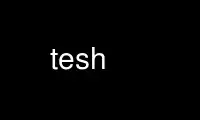
This is the command tesh that can be run in the OnWorks free hosting provider using one of our multiple free online workstations such as Ubuntu Online, Fedora Online, Windows online emulator or MAC OS online emulator
PROGRAM:
NAME
tesh - testing shell
SYNOPSIS
tesh [OPTION]... [FILE]...
DESCRIPTION
This is the TESH tool. It constitutes a testing shell, ie a sort of shell specialized to
run tests. The list of actions to take is parsed from files files called testsuite.
OPTIONS
--cd some/directory : ask tesh to switch the working directory before
launching the tests
--setenv var=value : set a specific environment variable
--cfg arg : add parameter --cfg=arg to each command line
--enable-coverage : ignore output lines starting with "profiling:"
TESH FILE SYNTAX
Here is the syntax of these files:
The kind of each line is given by the first char (the second char should be blank and is
ignored):
`$' command to run in foreground
`&' command to run in background
`<' input to pass to the command
`>' output expected from the command
`!' metacommand, which can be one of:
`timeout' <integer>|no
`expect signal' <signal name>
`expect return' <integer>
`output' <ignore|display>
`setenv <key>=<val>'
`p' a string to print
`P' a string to print at the CRITICAL level (ease logging grepping)
If the expected output do not match what the command spits, TESH will produce an error
showing the diff (see OUTPUT below).
IO ORDERS
The < and > lines add IO to the command defined in the current block (blocks are separated
by blank lines). It is possible to place these lines either after the command or before.
The difference between the two following chunks is mainly cosmetic in your testsuites,
TESH don't care. (cf IO-orders.tesh)
$ cat
< TOTO
> TOTO
> TOTO
$ cat
< TOTO
Nevertheless, it is possible to have several commands in the same block, but none of them
can have any output. It may seem a bit restrictive, as one could say that a command gets
all the IO until the next command, but I'm afraid of errors such as the following:
$ cd toto
> TOTO
$ mkfile file
TOTO will be passed to the cd command, where the user clearly want to pass it to the
mkfile built-in command (see below).
STREAM REDIRECTION
Stream redirections (">", "<" and "|" constructs in sh) are not implemented yet in tesh.
This is a bit restrictive, but well, patch welcome...
The situation in which it is mainly problematic is to create a temporary file. The
solution is to use the "mkfile" built-in command, as in the following example: $ mkfile
myFile > some content > to the file
This will create a file called myFile (first argument of the mkfile command). Its content
will be all the input provided to the command.
RETURN CODE
TESH spits an appropriate error message when the child do not return 0 as return code (cf.
catch-return.tesh), and returns code+40 itself.
It is also possible to specify that a given command must return another value. For this,
use the "expect return" metacommand, which takes an integer as argument. The change only
apply to the next command (cf. set-return.tesh).
SIGNALS
TESH detects when the child is killed by a signal (like on segfaults), and spits an
appropriate error message (cf. catch-signal.tesh).
It is also possible to specify that a given command must raise a given signal. For this,
use the "expect signal" metacommand. It takes the signal name as argument. The change only
apply to the next command (cf. set-signal.tesh).
TIMEOUTS
By default, all commands are given 5 seconds to execute (cf. catch-timeout.tesh). You can
change this with the "timeout", which takes an integer as argument. The change only apply
to the next command (cf. set-timeout.tesh). If you pass "no" as argument, the command
cannot timeout.
OUTPUT
By default, the commands output is matched against the one expected, and an error is
raised on discrepancy. Metacommands to change this:
"output ignore" -> output completely discarded
"output display" -> output displayed (but not verified)
"output sort" -> sorts the display before verifying it (see below)
SORTING OUTPUT
Sorting the output seems to be a strange idea, but it is mandatory in SimGrid since the
processes run out of order at any scheduling point (ie, every processes ready to run at
simulated time t run in parallel). To ensure that the simulator outputs still match, we
have to sort the output back before comparing it.
We expect the simulators to run with that log formatting argument:
--log=root.fmt:[%10.6r]%e(%i:%P@%h)%e%m%n Then, tesh sorts string on the 19 first chars
only, and is stable when line beginnings are equal. This should ensure that:
(1) tesh is effective (no false positive, no false negative)
(2) scheduling points are separated from each other
(3) at each scheduling point, processes are separated from each other
(4) the order of what a given process says at a given scheduling
point is preserved.
This is of course very SimGrid oriented, breaking the generality of tesh, but who cares,
actually?
If you want to change the length of the prefix used for the sort, simply specify it after
the output sort directive, like this:
! output sort 22
ENVIRONMENT
You can add some content to the tested processes environment with the setenv metacommand.
It works as expected. For example:
"setenv PATH=/bin"
Use tesh online using onworks.net services
